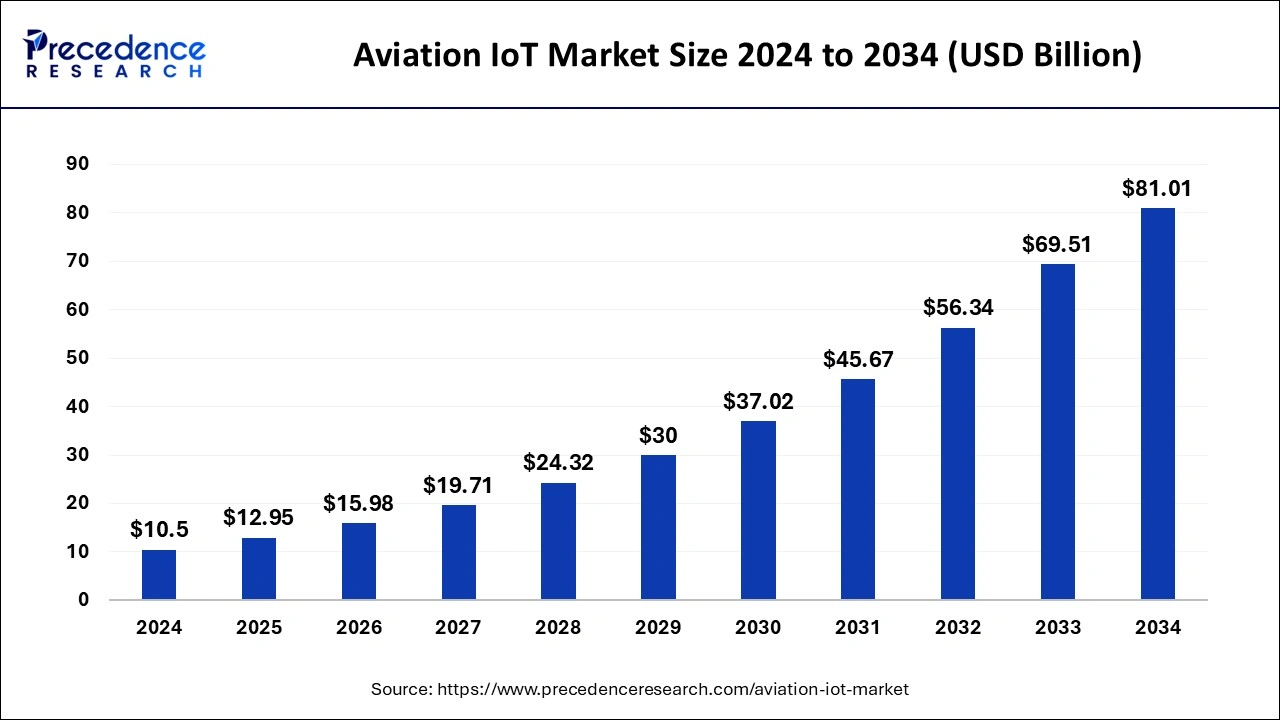The global aviation IoT market size reached USD 8.51 billion in 2023 and is anticipated to hit around USD 69.51 billion by 2033, expanding at a CAGR of 23.37% from 2024 to 2033.
Key Points
- North America has contributed more than 36% of market share in 2023.
- By application, the asset management segment has held a substantial market share of 31% in 2023.
- By component, the hardware segment has recorded the largest market share of 51% in 2023.
- By end-use, the airport segment has accounted the biggest market share of 36% in 2023.

The Aviation Internet of Things (IoT) market represents a segment within the broader IoT landscape that specifically focuses on applications and technologies tailored to the aviation industry. IoT in aviation refers to the integration of internet-connected devices, sensors, and data analytics to improve various aspects of airline operations, aircraft performance, passenger experience, and maintenance processes.
Get a Sample: https://www.precedenceresearch.com/sample/3984
Growth Factors
The Aviation IoT market is experiencing rapid growth driven by several factors. Firstly, the increasing demand for air travel worldwide has led airlines to seek innovative solutions to enhance operational efficiency, reduce costs, and improve safety. IoT technologies offer real-time monitoring and predictive maintenance capabilities, allowing airlines to optimize fleet management and minimize downtime. Additionally, regulatory mandates and safety standards require airlines to adopt advanced technologies to ensure compliance and enhance aircraft safety.
Region Insights
The adoption of IoT in aviation varies across different regions, influenced by factors such as regulatory environment, technological infrastructure, and market dynamics. Developed regions like North America and Europe have been early adopters of Aviation IoT solutions, driven by the presence of established aerospace industries, stringent safety regulations, and a strong focus on technological innovation. Emerging economies in Asia-Pacific, Latin America, and the Middle East are also witnessing increasing adoption of IoT in aviation, driven by growing air traffic, infrastructure development, and investments in modernizing fleet operations.
Aviation IoT Market Dynamics
Drivers
Several drivers are propelling the growth of the Aviation IoT market. One of the key drivers is the need for airlines to optimize operations and reduce operating costs amidst intense competition and volatile fuel prices. IoT-enabled solutions offer airlines real-time insights into aircraft performance, fuel efficiency, and maintenance requirements, enabling proactive decision-making and cost savings. Furthermore, the growing emphasis on passenger experience and in-flight connectivity has led airlines to invest in IoT technologies to offer personalized services, entertainment options, and seamless connectivity to passengers during their journey.
Opportunities
The Aviation IoT market presents numerous opportunities for stakeholders across the value chain. Airlines can leverage IoT solutions to enhance safety, reliability, and efficiency of their operations, leading to improved customer satisfaction and loyalty. Aircraft manufacturers and suppliers can capitalize on the growing demand for IoT-enabled aircraft systems and components, offering innovative solutions that meet the evolving needs of the aviation industry. Moreover, service providers and technology vendors can explore partnerships and collaborations to develop integrated IoT platforms and analytics solutions tailored to the aviation sector.
Challenges
Despite its potential, the Aviation IoT market faces several challenges that need to be addressed for widespread adoption and success. One of the primary challenges is ensuring cybersecurity and data privacy, as the interconnected nature of IoT devices introduces vulnerabilities that could be exploited by malicious actors. Additionally, interoperability and standardization issues pose challenges in integrating diverse IoT systems and devices across different aircraft platforms and operational environments. Moreover, concerns regarding regulatory compliance, certification, and liability issues require clear guidelines and frameworks to ensure the safe and responsible deployment of IoT technologies in aviation.
Recent Developments
- January 2024- Airbus opened a new ZEROe Development Center in Stade to develop revolutionary hydrogen technologies.
- In May 2023, the International Civil Aviation Organization (ICAO) released a new set of guidelines for the use of IoT in the aviation industry. The guidelines address a variety of topics, including data security, privacy, and interoperability.
- In April 2023, Delta Air Lines announced that it had installed a new IoT-powered baggage tracking system at its Atlanta airport hub. The system uses sensors to track the location of baggage in real time. This information is used to help passengers track their baggage and to identify any delays or disruptions in the baggage handling process.
- In March 2023, Airbus announced that it had partnered with Palantir Technologies to develop a new IoT platform for the aviation industry. The platform will collect and analyze data from various sources, including aircraft sensors, weather data, and flight schedules. This data will be used to improve the safety and efficiency of Airbus's operations.
- In February 2023, Lufthansa Technik announced that it had installed a fleet of 500 connected sensors on its aircraft. The sensors will collect data on engine performance, fuel consumption, and other metrics. This data will be used to improve the efficiency and safety of Lufthansa's operations.
Aviation IoT Market Companies
- Honeywell International, Inc.
- Tata Communication
- Cisco Systems, Inc.
- Huawei Technologies Co. Ltd.
- IBM Corp.
- Aeris Communication
- Microsoft Corp.
- Tech Mahindra Ltd.
- Wind River Systems, Inc.
- SAP SE
Segments Covered in the Report
By Application
- Ground Operations
- Passenger Experience
- Aircraft Operations
- Asset Management
By End-Use
- Airport
- Airline Operators
- MRO
- Aircraft OEM
By Component
- Hardware
- Software
- Service
By Geography
- North America
- Europe
- Asia-Pacific
- Latin America
- Middle East and Africa
Contact Us:
Mr. Alex
Sales Manager
Call: +1 9197 992 333
Email: sales@precedenceresearch.com
Web: https://www.precedenceresearch.com
Blog: https://www.expresswebwire.com/
Blog: https://www.uswebwire.com/


0 Comments